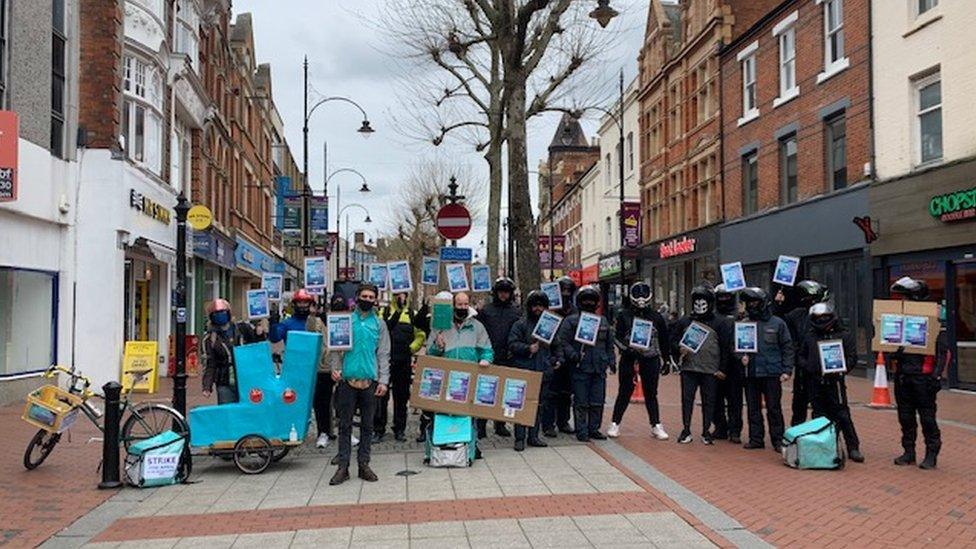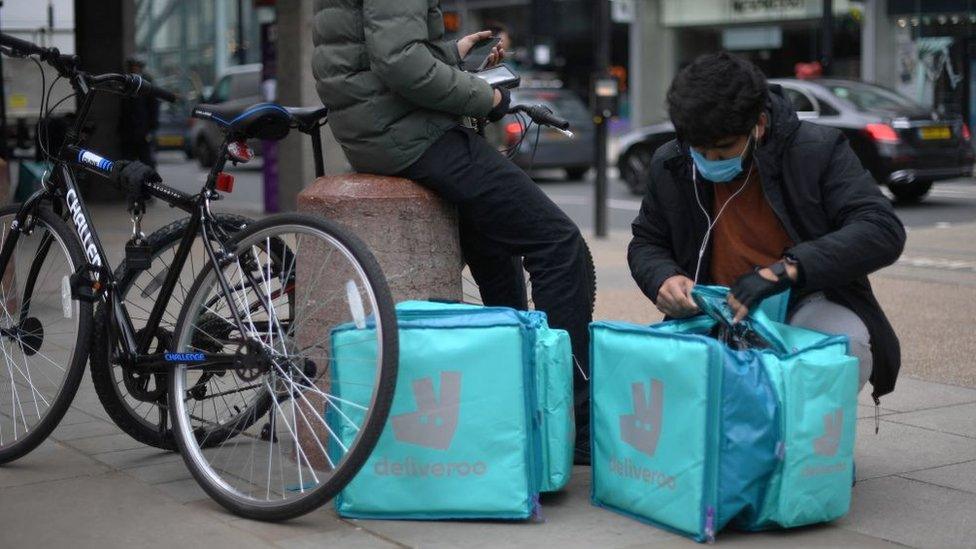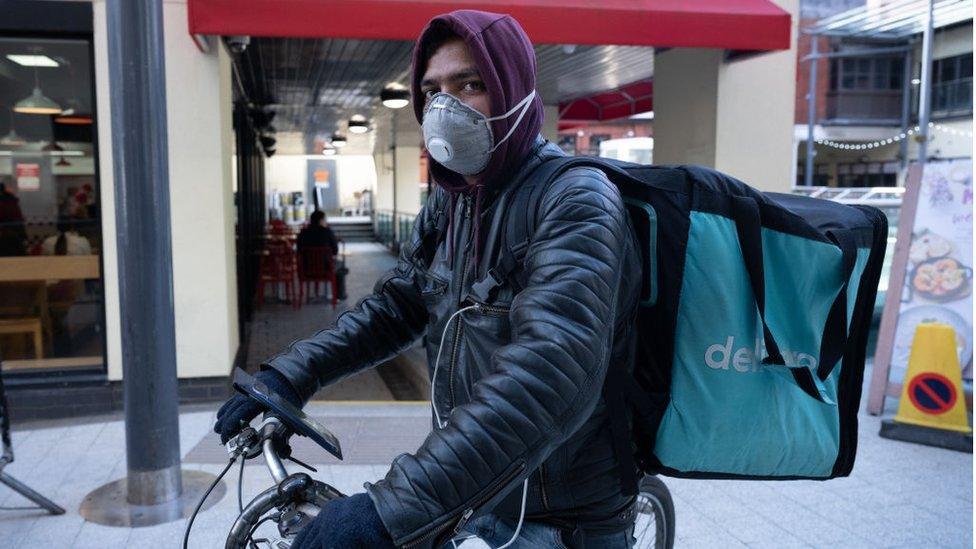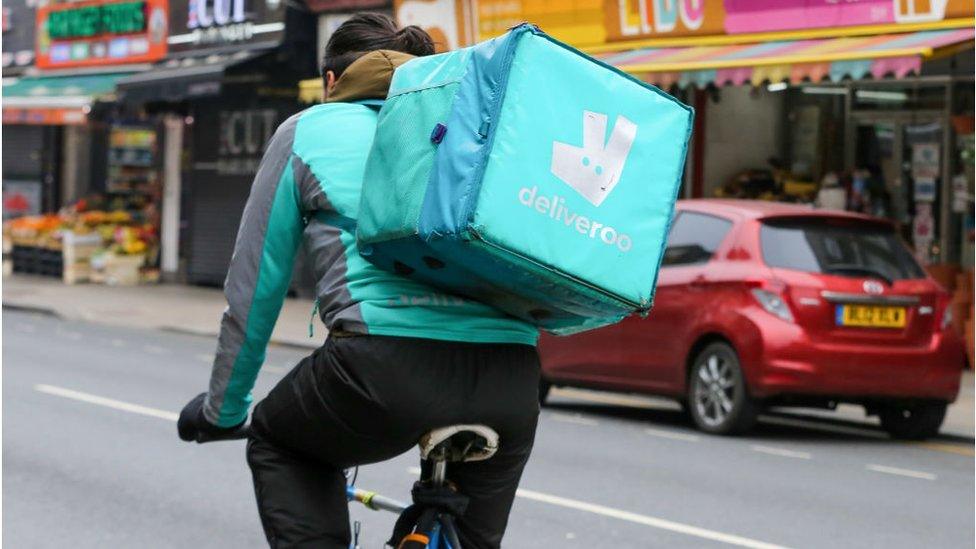Deliveroo shares rise on first full trading day as some riders go on strike
- Published
- comments

Deliveroo riders held small protests around the UK on Tuesday
Deliveroo shares have edged up on their first fully open day of trading on the London Stock Exchange.
Shares rose more than2% to 286p at 12:00 on Wednesday, when 70,000 retail investors were allowed to trade.
They are still well below the 390p paid as the shares dived on their debut last week amid big investors' concerns over workers' rights and profits.
Hundreds of Deliveroo riders are expected to go on strike on Wednesday as they call for higher pay.
Deliveroo said it was organised by a small "union [that] does not represent the vast majority of riders".
The firm employs 50,000 riders, but only 400 are expected to take part in the strike. They are calling for riders to be paid the living wage after accounting for costs such as fuel, as well as an end to unpaid waiting times.
Deliveroo said its own survey data showed 90% of riders were happy with firm.
The food delivery firm's share sale marked London's biggest stock market launch for a decade, but the sharp fall seen saw it dubbed "the worst IPO [initial public offering] in the history of London".
Smaller investors, known as retail investors, got their first chance to trade their shares on Wednesday as what is described as "unconditional trading" began.
Despite small gains on Wednesday, the company's share price is still far below its 390p float price on its debut when big investors and Deliveroo customers could buy or sell shares. The company had initially hoped for a share price of up to 460p.
Deliveroo, which has not yet made a profit, had to accept a lower price, saying it had chosen to "price responsibly" and sell its shares at the bottom of its planned price range due to "volatile" market conditions.
Investment bank Goldman Sachs, which was an adviser to Deliveroo and was responsible for stabilising the share price, had to buy about £75m worth of Deliveroo shares to support the share price in the first few days, according to the Financial Times, external.

How did Deliveroo's IPO work?
An IPO is one way for private companies to raise cash. An initial public offering sees shares offered to major investors, including pension and insurance companies, as well, sometimes, as private small investors.
They let the company know what they are prepared to pay for the shares, in conjunction with investment banks and other professional advisers hired by a company.
The shares then launch on a stock market. Deliveroo shares were only tradeable over the first week by major investors who had bought large chunks. Full trading, allowing anyone to buy and sell, began a week later. Trading on a stock market allows the price to be set freely in the open market by supply and demand.
The value of the shares, multiplied by how many there are, gives the market value of the company.

Some of the UK's biggest investment fund managers, such as Aberdeen Standard, Aviva Investors, BMO Global, charity fund manager CCLA, Legal and General Investment Management and M&G said they would not buy shares in Deliveroo, citing concerns, including over the working conditions of its riders.
Analyst Susannah Streeter at stockbrokers Hargreaves Lansdown said that retail investors don't appear to share the same worries.
She said a surge of interest from smaller investors "will be some comfort for Deliveroo customers who were encouraged to buy a slice of the company but appeared to have thrown the dice on a disastrous debut.
"They were locked out of selling their shares for a week, while the company's initial valuation fell sharply. Now they finally have a 'get out of jail' card, but it seems for now that many have kept it in their back pocket, waiting it out for prices to stabilise."
Neil Wilson, chief market analyst of Markets.com, warned that the strike action by hundreds of UK riders due to start on Wednesday "underlines the regulatory risk attached to the stock".
About 400 of the food couriers in five towns and cities are also expected to stage socially-distanced protests over pay and conditions.

"I'm going on strike for my basic rights and those of all the other riders struggling to get by and support families on Deliveroo poverty pay," said Greg Howard, a Deliveroo rider and the chair of the IWGB's couriers and logistics branch.
He said: "I've seen conditions decline for years and then working through lockdown I contracted Covid-19 and got very little support from Deliveroo."
But Husain, a driver from Nottingham, told the Deliveroo survey: "Deliveroo let you work whenever it suits you plus customers are so nice and respectful compared to other platforms. App is really easy to use and understand and shows you when to make good money."
Deliveroo said it had surveyed 8,500 riders on Tuesday, and found 89% were happy with the company and flexibility it offers.
A spokesperson said the IWGB union did "not represent the vast majority of riders who tell us they value the total flexibility they enjoy while working with Deliveroo alongside the ability to earn over £13 an hour.
"We are proud that rider satisfaction is at an all-time high and that thousands of people are applying to be Deliveroo riders each and every week. Riders are at the heart of our business and today we are beginning a new consultation with riders about how we should invest our new £50m community fund."
Related topics
- Published31 March 2021

- Published25 March 2021
